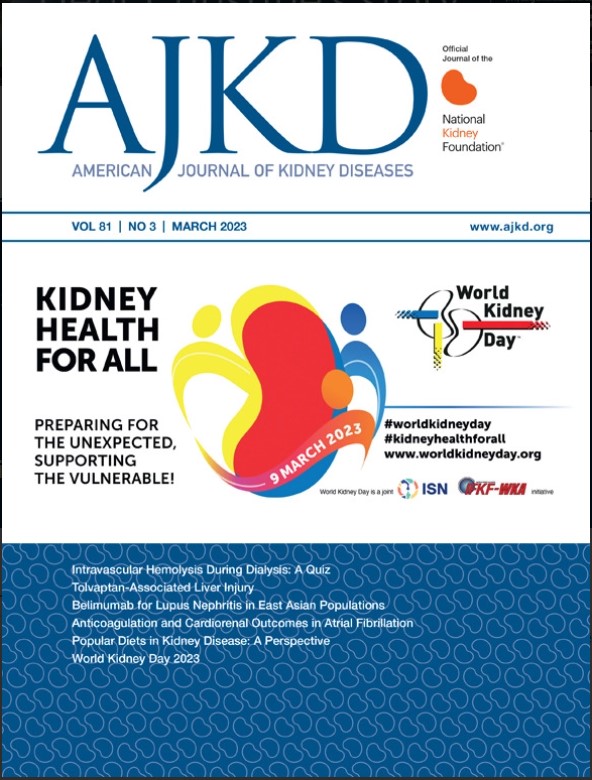Peer Support Interventions for People With CKD: A Scoping Review
IF 8.2
1区 医学
Q1 UROLOGY & NEPHROLOGY
引用次数: 0
Abstract
Rationale & Objective
Formalized peer support is a promising approach for addressing the emotional and practical needs of people living with chronic kidney disease (CKD). We systematically identified and summarized peer support interventions studied in individuals with CKD with or without kidney replacement therapy (KRT).
Sources of Evidence
Search of electronic databases and grey literature sources in March 2023.
Eligibility Criteria
Studies of any design were eligible if they reported sufficient detail on peer support interventions and outcomes for adults with CKD with or without KRT and/or their caregivers.
Charting Methods
We extracted information on study and intervention characteristics and reported outcomes using established frameworks. We summarized quantitative data descriptively and qualitative data thematically. Our approach observed the Preferred Reporting Items for Systematic Reviews and Meta-Analyses (PRISMA) extension for scoping reviews.
Results
We included 77 studies describing 56 unique peer support interventions. Most reports were program evaluations (39%) or randomized controlled trials (27%) published after 2013. Two-thirds of interventions focused on in-center hemodialysis or mixed CKD populations, and three quarters were integrated within a kidney care clinic or program. Whereas most peer interactions centered on informational support, few programs offered focused support in areas such as transplant navigation or dialysis modality selection. Only one-third of outcomes were assessed against a comparator group, with results suggesting improvements in psychological health with peer support.
Limitations
Heterogeneity of included studies; lack of rigorous program evaluation.
Conclusions
This review suggests recent growth in peer support programming with a variety of formats and delivery methods to address the diverse needs of people living with kidney disease. Notable gaps in peer support availability for transplant and home dialysis recipients and the lack of rigorous evaluations present opportunities to expand the reach and impact of peer support in the kidney care context.
Plain-Language Summary
Many people with kidney disease struggle with isolation, making decisions about their care, and declines in their mental well-being. Peer support is a way of providing information and emotional support to patients and their loved ones by connecting them with others who have a shared experience of kidney disease. We summarize the features of peer support programs worldwide and the settings in which they have been studied. We searched the medical literature and found 56 unique peer support programs reported in 77 studies. Most studies were from the last 10 years, targeted people receiving hemodialysis, and focused on sharing information about kidney disease. Studies summarized in this review revealed notable gaps in peer support availability for transplant and home dialysis recipients. Many studies found improvements in people’s mental health, quality of life, and confidence in managing their health after initiation of peer support. These findings suggest there are unrealized opportunities to expand the reach and impact of peer support in the care of patients with kidney disease.

针对慢性肾脏病患者的同伴支持干预:范围界定综述。
理由与目标:正式的同伴支持是解决慢性肾脏病(CKD)患者情感和实际需求的一种有前途的方法。我们旨在系统地识别和总结针对接受或未接受肾脏替代治疗(KRT)的 CKD 患者的同伴支持干预措施:我们检索了 2023 年 3 月的电子数据库和灰色文献资料:任何设计的研究,只要充分详细地报告了针对接受或未接受 KRT 治疗的 CKD 成人和/或其护理人员的同伴支持干预措施和结果,均符合条件:我们使用既定框架提取了有关研究和干预特征的信息,并报告了结果。我们对定量数据进行了描述性总结,对定性数据进行了专题总结。我们的方法遵循了系统综述和荟萃分析首选报告项目(PRISMA)的扩展,用于范围界定综述:结果:我们纳入了 77 项研究,描述了 56 种独特的同伴支持干预措施。大多数报告是在 2013 年之后发表的项目评估(39%)或随机对照试验(27%)。三分之二的干预措施侧重于中心内血液透析或混合型慢性肾脏病人群,四分之三的干预措施整合在肾脏护理诊所或项目中。大多数同伴互动以信息支持为中心,很少有项目在移植导航或透析方式选择等方面提供重点支持。只有三分之一的研究结果是与对比组进行评估的,结果表明同伴支持改善了患者的心理健康:局限性:纳入的研究具有异质性;缺乏严格的项目评估:本综述表明,近来同伴支持计划有了很大发展,其形式和实施方法多种多样,以满足肾病患者的不同需求。在为移植和家庭透析受者提供同伴支持方面存在明显差距,而且缺乏严格的评估,这为扩大同伴支持在肾脏护理领域的覆盖面和影响力提供了机会。
本文章由计算机程序翻译,如有差异,请以英文原文为准。
求助全文
约1分钟内获得全文
求助全文
来源期刊

American Journal of Kidney Diseases
医学-泌尿学与肾脏学
CiteScore
20.40
自引率
2.30%
发文量
732
审稿时长
3-8 weeks
期刊介绍:
The American Journal of Kidney Diseases (AJKD), the National Kidney Foundation's official journal, is globally recognized for its leadership in clinical nephrology content. Monthly, AJKD publishes original investigations on kidney diseases, hypertension, dialysis therapies, and kidney transplantation. Rigorous peer-review, statistical scrutiny, and a structured format characterize the publication process. Each issue includes case reports unveiling new diseases and potential therapeutic strategies.
 求助内容:
求助内容: 应助结果提醒方式:
应助结果提醒方式:


